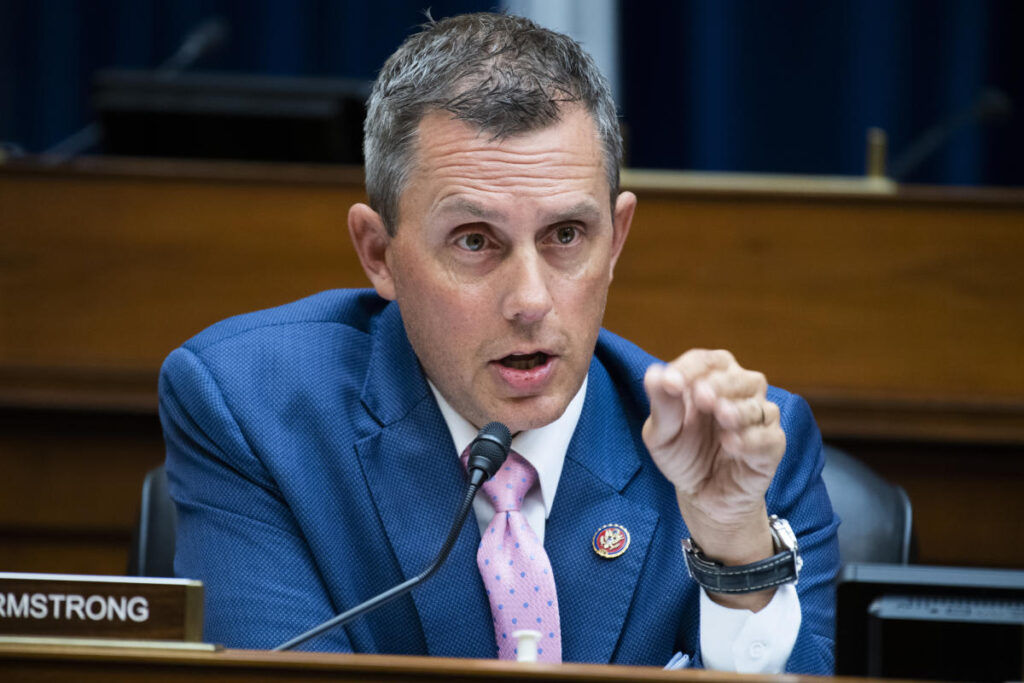In North Dakota, the race for the governorship is heating up, centered around U.S. Rep. Kelly Armstrong, who is vying to continue the state’s longstanding Republican leadership. Armstrong, the state’s sole congressman, faces challenges from Democratic state Sen. Merrill Piepkorn and independent candidate Michael Coachman in the upcoming general election. The Republican primary held in June saw Armstrong defeat Lt. Gov. Tammy Miller, cementing his position as the frontrunner, backed by the state’s predominantly Republican voter base. The lasting Republican dominance in North Dakota’s gubernatorial role has persisted since 1992, making Armstrong a favorite to carry the party’s banner into the governor’s mansion if he secures victory on Tuesday.
Armstrong, at 48 years old, boasts a political career that includes six years in the state Senate before winning a seat in the U.S. House of Representatives in 2018. With three successful election campaigns under his belt, including a recent victory against former Miss America Cara Mund, Armstrong has established himself as a significant figure within North Dakota’s political landscape. His legal background and investments in oil and gas, particularly through a family-owned company, position him favorably for a role on the state Industrial Commission, which oversees energy operations. His actions in Congress, including supporting former President Donald Trump during impeachment proceedings and voting for protections of same-sex and interracial marriage rights, illustrate his complex political stance, which could attract diverse voters.
As Armstrong seeks to progress from Congress to the governor’s office, he has indicated plans to resign his House seat slightly early to begin his gubernatorial duties on December 15. This decision raises implications for the Republican majority in the House during a critical period. If successful, Armstrong will return to the state legislature, where he is likely to collaborate with familiar lawmakers amid recent intra-party tensions among Republicans. His candidacy arrives at a time when the state legislature remains predominantly under Republican control, despite recent discord over party lines.
On the opposing front, Merrill Piepkorn, 75, represents the dwindling Democratic presence in North Dakota’s Senate, holding a mere four out of 47 seats. Piepkorn also runs a company that manages various media productions, indicating his background in media and event management, yet he faces a steep uphill battle given the current political landscape tilted in favor of Republicans. Michael Coachman, an independent candidate and military veteran, completes the electoral mix, while multiple issues await the next governor, including the resolution of statewide controversies such as a potential property tax repeal and a judge’s ruling on the abortion ban.
Armstrong aims to succeed two-term Republican Gov. Doug Burgum, who opted not to pursue a third term. Burgum, a notable figure in North Dakota’s recent political history, has influenced the governance approach alongside business-minded predecessors. Should Armstrong secure the governorship, he would break a 52-year pattern, becoming the first sitting member of Congress to transition directly into this state role. The political climate indicates substantial challenges ahead, including addressing workforce shortages, enhancing childcare solutions, and navigating the complex repercussions of recent legislative changes, including the newly introduced term limits for governors.
With North Dakota boasting a robust economic situation evidenced by a low unemployment rate of 2.3% and a solid financial reserve, the new governor’s administration must be prepared to tackle emerging legislative issues. As voters cast their ballots, the priority topics include resolving property tax concerns, responding to the abortion ban ruling, and addressing the growing labor shortage in the state. The combination of Armstrong’s extensive political experience and the pressing issues on the horizon lays a critical foundation for the upcoming election, where Republicans are predicted to maintain a stronghold over the Legislature, steering policies on a range of compelling subjects prominent within the state.

